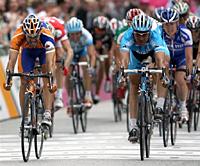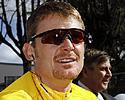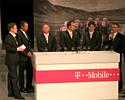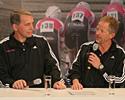First Edition Cycling News for July 31, 2006Edited by Hedwig Kröner Freire in close sprint
Oscar Freire (Rabobank) has taken a very tight sprint ahead of Erik Zabel (Milram) and defending champ Filippo Pozzato (Quick.Step) to win the Vattenfall Cyclassics in Hamburg. The race finished with approximately 40 riders left in the lead group, with Quick.Step, Rabobank and Lampre all working to ensure that it was decided in a bunch sprint. Freire and Zabel were neck and neck until just before the line, when Freire managed to get his wheel in front for the victory. "This is another important win for me, especially as it's a classic," said Freire. "I was behind Zabel, and passed him in the right moment. But we were all equally strong and in the end, only throwing our bikes to the line in the last three metres counted for the victory. Zabel told me that I had won, but I wasn't too sure and wanted to see the photo finish." The race was held in perfect conditions and saw a three man break get away after 40 km: Dario Andriotto (Liquigas), Corey Sweet (Wiesenhof) and Laszlo Bodrogi (Credit Agricole). The group gained as much as 13 minutes, but was brought back to 9 minutes by the halfway point, when Andriotto crashed out of the race after hitting a TV camera moto. The peloton swept up the remaining two leaders with 60 km left, and the finale began. Philippe Gilbert (FDJ) attacked at 30 km to go, just before the penultimate climb of the Waseberg, and was joined by Fabian Wegmann (Gerolsteiner) over the top. The two managed almost a minute's lead, but were brought back before the last climb with 18 km to go. The final ascent of the Waseberg saw Rebellin, Moletta (Gerolsteiner), Paolini (Liquigas), Celestino (Milram), Figueras (Lampre), and Mori (Saunier) get a gap, but they couldn't hold off the peloton's chase, and it was all together with 7 km to go. After that, the teams with sprinters still left in the race kept the pace high enough for a bunch sprint, with Freire edging out Zabel and Pozzato for the win. Click here for the full results & report. Zabel happy with resultA radiating Erik Zabel jumped on the podium in Sunday's Vattenfall Cyclassics in Hamburg, Germany. The Milram sprinter had just finished second behind Rabobank's Oscar Freire in the one-day ProTour classic, but the order of the top three had to be decided on using a photo finish: only centimetres separated the two men and Quickstep's Filippo Pozzato, who finished third. "Oscar's done this to me already a few times...," he happily said on German television ARD. "But I don't put my hands in the air anymore, never! This morning, at the sign-in, we joked around saying that as McEwen and Boonen weren't here, if it came down to a sprint I would have good chances. But everybody forgot, as usual, Oscar Freire and he proved in the end that you have to take him into account!" The 35 year-old thought that Freire had won immediately after passing the finish line, but the result was very tight. "We congratulated each other after the line and we all speculated that it was Oscar first, then me, then Pozzato," he continued. "I'm not disappointed at all, even if some people might not believe me. I can live with losing this way against Oscar. He's known to have that enormous speed towards the line." Zabel was simply very satisfied to be at the same level than his colleagues. "Two years ago, when Stuey O'Grady won, I got seventh, and that drove me really mad," he said. "Because it was a sprint that suited me, and I didn't have the drive to really start sprinting then. This year, I chose to stay on Pozzato's wheel as long as possible, because I thought he'd have some guys left to lead out the sprint for him like Tosatto and Bettini. And I told myself, 'I'll just try; when we pass the 150 metre-mark, I'll go for it come what may.'" An additional motivation for the German and his team was that the headquarters of their sponsor, dairy producer Milram, is nearby in Northern Germany. "Our main sponsor is located in Bremen, so that's not far away at all," Zabel explained. "Moreover now, everything in cycling is being questioned, so our boys couldn't be held back today. Our directeur sportif Jan Schaffrath told us this morning that this is our world championship... so that's why we all went flat out today." L'Equipe reports exogenous testosterone in Landis' A sampleBy Hedwig Kröner
The aftermath of 2006 Tour de France winner Floyd Landis' positive A probe for performance-enhancing hormone testosterone is far from over. Germany's public TV stations ARD and ZDF have since questioned their transmission of cycling races if the sports biggest problem is not solved, and the German cycling federation called for an anti-doping law in Germany on Saturday, one day prior to the ProTour one-day race Vattenfall Cyclassics in Hamburg. To explain the positive doping test result after stage 17 of the Tour de France, which he won after an impressive solo ride in high mountains, Landis has argued that his relatively high level of testosterone was naturally produced by his own body. The analytical basis for the test being the ratio between testosterone and epitestosterone, normally averaging 1:1, a suspicion of doping is being issued if this ratio is higher than 4:1. In Landis' case, German media have on Sunday rumoured the result to be 11:1 (all that can be assumed, however, is that Landis must have been over 4:1). "In our medical files appear not only blood levels, but also our testosterone status," said professional cyclists' representative Jens Voigt before the race. "It shouldn't be hard to find out if Landis is telling the truth." The tests performed on Landis' A sample included an Isotope Ratio Mass Spectrometry (IRMS) procedure, used to determine whether the testosterone is exogenous (contained within, but originating from outside the body) or endogenous (produced by the body itself). In the case of Landis, L'Equipe reported that the analysis found testosterone of artificial origin. It's understood the French newspaper received this information from a source within Chatenay-Malabry labortory that conducted the test on Landis' sample. Jose Maria Buxeda, Landis' attorney, contests the detection method via IRMS. "It's not reliable," he told French L'Equipe. "Most laboratories do not use it. In fact, the laboratory of Chatenay-Malabry must be the only one still using it." In the same edition of the paper, however, Christiane Ayotte, director of an anti-doping laboratory in Montreal, Canada, disagrees. "We use the method regularly," she said. "Moreover, more than half of the WADA-accredited labs perform it successfully. I'd even say that an IRMS which gives a synthetic result is very hard to contest. It's not a method that anyone can apply but the LNDD (Laboratoire de Chatenay-Malabry) has totally proven itself in this domain." It has been pointed out that Landis' thyroid problems, the treatment of his inflamed hip with corticosteroids, as well as drinking alcohol on the night prior to stage 17, could be factors which could have affected his testosterone levels. "As soon as an athlete is controlled positive for testosterone, the same old stories come up," Ayotte continued. "The increase, even if natural, of the ratio testosterone/epitestosterone cannot, in any case, be explained by taking thyroid hormones or corticosteroids. Alcohol can in fact influence it, but only with women, and only for three or four hours." T-Mobile changes management
The German magenta squad, T-Mobile, has announced that it will not be managed by the Olaf Ludwig Cycling (OLC) company anymore. The sports communication representatives of the German mobile telephony giant have decided, "following a series of intensive discussions before and after the Tour de France", to end the contract binding the cycling team to the management company headed by former pro racer Olaf Ludwig on October 31 this year. In the meantime, Bob Stapleton will take over as new team manager. The 48 year-old American will work together with Olaf Ludwig to ensure the transition period. "The determining factor was a lack of confidence in the team management, as well as many radically differing ideas on the future strategy and direction of the T-Mobile Team and the handling of the current doping problem," explained Christian Frommert, director of sports communication at T-Mobile International. "The full details of the announced new setup will be communicated by the end of August at the latest." It is believed unlikely that Mario Kummer will then still be included in the team's staff. But one new sports director is already nominated: former T-Mobile pro Rolf Aldag.
"Rolf will oversee the team in his role as sporting director and will take responsibility for the athletes," said future team manager Stapleton, a 48 year-old American entrepreneur who was the founder and director of the mobile communications firm Voicestream Wireless, which is now T-Mobile USA. Stapleton is also the owner of High Road Sports Inc., the company that runs the T-Mobile women’s team. The new subsidiary of High Road, 'Neuer Straßen Sport GmbH' will be based in Cologne, and will in future operate the men’s team on behalf of T-Mobile International. "After 15 years of involvement in cycling, we have a high level of responsibility towards the sport", said T-Mobile CEO René Obermann. "For this reason the company has decided to proceed with its planned cycling engagement. T-Mobile believes that sport should be kept clean, and will actively play a role in helping restore cycling’s credibility. The goal, alongside sporting success, is to make an efficient and lasting contribution to resolving cycling’s current difficulties." Added Christian Frommert: "With the restructuring of the team we will see to it that this challenge is met both on an internal, as well as external basis." Valverde back for San SebastianAlejandro Valverde is happy, as on Sunday the Spanish cyclist received the honours of having a street in his town, Monteagudo in Murcia, Spain, named after him. The Caisse d'Epargne leader also has good feelings when he is training. "At the moment, I'm already able to surpass 100 kilometres, although I need to work on the basis," he told El Faro de Murcia in view of the next Vuelta a España. "I will be in the Vuelta for sure, and try to do as well as possible. I don't know who my rivals will be, but it doesn't matter." Valverde, who crashed out of the Tour de France earlier this month, breaking his collarbone, will back to raci ng at the Clasica San Sebastian on August 12, "and 24 hours later I will be onthe Urkiola climb," he said, eager to perform again. The 2006 Vuelta will start in Málaga on August 26. The talented Spaniard does not know the Vuelta a España 2006 route in depth, but he is convinced that, "the final stages on the top of La Covatilla, El Morredero y La Cobertoria will be more decisive than the other ones." Valverde is not afraid of the more than 50 kilometres against the clock, "because I am working on this discipline and getting good results." In addition, Valverde assured that, "for the Vuelta, I will be full of morale and enthusiasm and in the best state of form possible." Courtesy of Antonio J. Salmerón
(All rights reserved/Copyright Knapp Communications Pty Limited 2006) |

|
January 2009 |
Recently on Cyclingnews.com |




